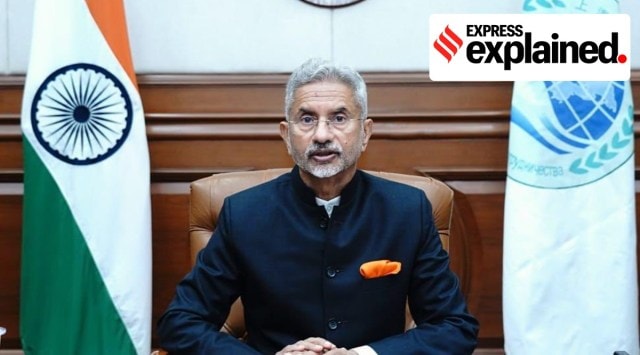- India
- International
On China’s Belt and Road, how Jaishankar reiterated India’s longstanding, consistent position
The Belt and Road Initiative is a massive multinational, multi-modal connectivity infrastructure project promoted by China. India does not support the BRI, and has declined to join the project.
 External Affairs Minister S Jaishankar participates in a virtual meeting of the Shanghai Cooperation Organisation. (Twitter/@DrSJaishankar)
External Affairs Minister S Jaishankar participates in a virtual meeting of the Shanghai Cooperation Organisation. (Twitter/@DrSJaishankar)External Affairs Minister S Jaishankar on Tuesday (November 1) told a virtual meeting of the Shanghai Cooperation Organisation (SCO) hosted by Chinese Premier Li Keqiang that “connectivity projects should respect the sovereignty and territorial integrity of Member States and respect international law”.
Will unlock the economic potential of this region in which Chabahar port and the International North South Transport Corridor could become enablers. Connectivity projects should respect the sovereignty and territorial integrity of Member States and respect international law.
— Dr. S. Jaishankar (@DrSJaishankar) November 1, 2022
Jaishankar’s statement is seen as a reference to the Belt and Road Initiative (BRI), a massive multinational, multi-modal connectivity infrastructure project promoted by China. India does not support the BRI, and has declined to join the project.
A joint communique issued at the end of Tuesday’s meeting said Kazakhstan, Kyrgyz Republic, Pakistan, Russia, Tajikistan, and Uzbekistan reaffirmed their support for China’s BRI and to work jointly to implement the project.
The major reason India opposes BRI is because it passes through Indian territory that is illegally held by Pakistan.
The arm of the BRI project that links mainland China to the Arabian Sea runs from Kashgar in China’s Xinjiang Uighur Autonomous Region to Gwadar port in southwestern Baluchistan in Pakistan. The project enters Indian territory occupied by Pakistan in Gilgit Baltistan, and traverses the entire length of Pakistan from north to south before reaching the Arabian Sea.
This arm of the BRI is called the China-Pakistan Economic Corridor, or CPEC, and consists of multiple modern highway and railway projects. It involves the planned rebuilding and upgradation of Pakistan’s National Highway 35 — the Karakoram Highway or China-Pakistan Friendship Highway — that goes from the Khunjerab Pass on the Xinjiang border to Hasan Abdal to the northwest of Islamabad via Gilgit and Mansehra, and the upgradation of the highway that links Gilgit with Skardu to the north of the Line of Control (LoC).

India has repeatedly voiced its concern and opposition to the CPEC, and flagged the violation of international law in its building by China and Pakistan.
* On May 13, 2017, the official spokesperson of the Ministry of External Affairs had said: “Regarding the so-called ‘China-Pakistan Economic Corridor’, which is being projected as the flagship project of the BRI/OBOR, the international community is well aware of India’s position. No country can accept a project that ignores its core concerns on sovereignty and territorial integrity.”
The spokesperson reiterated India’s firm belief that “connectivity initiatives must be based on universally recognised international norms, good governance, rule of law, openness, transparency and equality”, and that “connectivity projects must be pursued in a manner that respects sovereignty and territorial integrity”.
* In October 2021, speaking at the UN Sustainable Transport Conference hosted by Beijing, Priyanka Sohoni, Second Secretary at the Indian Embassy in China, said: “There have been some references to the Belt and Road Initiative or BRI at this conference. Here, I wish to say that as far as China’s BRI is concerned, we are uniquely affected by it. It’s inclusion of the so-called China Pakistan Economic Corridor (CPEC) as a flagship project impinges on India’s sovereignty.”
Sohoni underlined that India shares “the international community’s desire for enhancing physical connectivity”, and the “expansion and strengthening of physical connectivity is an integral part of India’s economic and diplomatic initiatives”. India, she said, “believes it should bring greater economic benefits to all in an equitable and balanced manner”.
Interestingly, media reports from the time noted that “the Indian diplomat’s mike curiously went silent while she was highlighting New Delhi’s objection to the controversial projects”.
* In July 2022, India took note of reports about the participation of third countries in CPEC projects, and cautioned that “any such actions directly infringe on India’s sovereignty and territorial integrity”. MEA official spokesperson Arindam Bagchi said: “India firmly and consistently opposes projects in the so-called CPEC, which are in Indian territory that has been illegally occupied by Pakistan.”
We have seen reports on encouraging a proposed participation of third countries in so-called CPEC projects. Any such actions by any party directly infringe on India’s sovereignty and territorial integrity: MEA Spokesperson Arindam Bagchi
(File photo) pic.twitter.com/k6KU8WOe82
— ANI (@ANI) July 26, 2022
* As far back as in 1994, India’s Parliament had resolved unanimously that the entire former princely state of Jammu and Kashmir belongs to India, and that India’s position has been clear and consistent in this regard. On March 11, 2020, the government told Parliament that India’s “consistent and principled position, as also enunciated in the Parliament resolution adopted unanimously by both Houses on 22 February 1994, is that the entire Union Territories of Jammu & Kashmir and Ladakh have been, are and shall be an integral part of India”.
More Explained
EXPRESS OPINION
Apr 19: Latest News
- 01
- 02
- 03
- 04
- 05








































